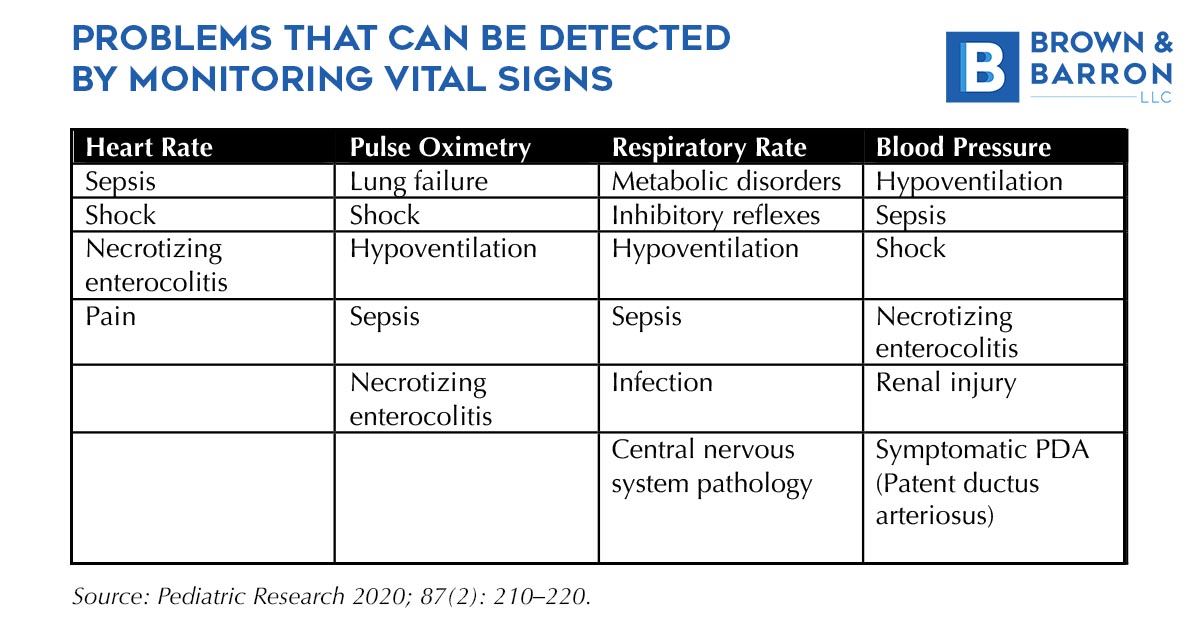Continuous monitoring of a baby’s vital signs is important to the prevention of neonatal diseases and birth injuries, especially for premature babies. Health problems can be solved before they become more serious when doctors and nurses closely monitor the baby’s heart rate, pulse, respiratory rate, and blood pressure, among other vital signs. If they do NOT provide adequate monitoring (during and after labor), a preventable birth injury might occur, and they can be held liable in a birth injury lawsuit in Maryland.
To schedule a free case review with a birth injury lawyer serving Baltimore, call Brown & Barron at (410) 698-1717 or contact us online today!
According to the medical journal, Pediatric Research in 2019, “Recent studies in neonates suggest that cumulative analysis of monitor-recorded continuous vital signs trends can predict impending clinical deterioration or disease, such as sepsis, and may also predict long-term neurological or respiratory outcomes.” In Maryland, when babies are harmed by diseases or birth injuries, and it is determined it could have been prevented with monitoring, it can be argued that medical malpractice has occurred. For some of these birth injuries, residents of Maryland can sue for damages as parents and on behalf of their children.
Vital Signs: What Are the Normal Ranges?
For neonates and newborns, the medical staff at the hospital should be monitoring vital signs to ensure that they are within the established safe range. Here are the normal ranges for neonatal vital signs:
- Temperature: Stable body temperature of 97.0°F to 98.6°F.
- Heartbeat: 120 to 160 beats per minute.
- Breathing rate: 40 to 60 breaths per minute.
- Blood pressure: Systolic of between 60 and 80, and a diastolic of between 30 and 45.
- Oxygen saturation: 95% to 100%.
Source: Nationwide Children’s

The Importance of Monitoring Fetal Heart Rate
A slow heartbeat, called fetal bradycardia, refers to a heart rate that is less than 110 bpm. Bradycardia be a sign of bleeding in the brain, such as an epidural or subdural hemorrhage, according to National Library of Medicine of the National Institute of Health. The baby’s heart rate can be monitored in one of two ways:
- Auscultation (using a stethoscope)
- Electronic fetal monitoring
If you want more articles like this, subscribe to our free monthly newsletter by clicking here.
What Is Electronic Fetal Monitoring?
Electronic Fetal Monitoring (EFM) is a continuous test of baby’s heart rate by using external testing equipment attached to the mother’s abdomen (e.g., ultrasound) or internally directly onto the baby’s head via a catheter through the vagina. Whereas the stethoscope (auscultation) method requires periodic measurements, the EFM method gives real-time updates on the baby’s heart.
EFM is usually reserved for at-risk pregnancies. According to the Cleveland Clinic, the conditions that would indicate the use of EFM include:
- When the mother has preeclampsia, diabetes, previous cesarean or bleeding during pregnancy.
- When labor must be induced
- Meconium staining (release of stool by the baby) during labor
- Small fetal size or congenital abnormalities
When Failure to Monitor Leads to Preventable Injury
Careful monitoring of the baby’s vital signs can save precious time necessary to intervene before an issue becomes a permanent injury. Some injuries are unavoidable; however, there are instances where the failure to monitor results in permanent disability or even death of the child. It can be difficult for the average person to draw the line between an unavoidable situation and a case of medical malpractice. If the baby is injured during childbirth, it can mean a lifetime of expensive care and equipment. The parents should immediately contact a birth injury lawyer in Maryland to thoroughly investigate whether malpractice actually occurred and consult an expert to determine the lifecare plan and the amount it will require to provide the best quality of life for the victim on the road ahead.
To schedule a free case review with a birth injury lawyer serving Baltimore, call Brown & Barron at (410) 698-1717 or contact us online today!
If you want more articles like this, subscribe to our free monthly newsletter by clicking here.


